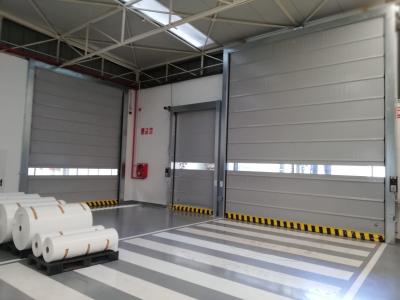

Digital Transformation, Energy Efficiency and Higher Quality: Challenges For the Automatic Door Sector In 2020
The demand for greater energy efficiency, digital transformation and higher quality will be features for the future of the automatic door sector in 2020. Directors of Kallan Doors, Nayar System, Temeyco, Watchman Doors, New Gate and Nice Automation analyse the main challenges facing the sector this year. Read more
Ángel Ignacio Criado, Marketing Manager at KALLAN DOORS, considers that “2020 will be the year in which energy efficiency will become consolidated as a requirement, a standard recognised and demanded by the user automatic doors, as is already the case with security and home automation, in a world that is increasingly concerned about the environment and our future.”
Boris Escandell, Sales Representative of NAYAR SYSTEMS, says that the automatic doors sector is going to experience a digital transformation process by applying of the IoT (Internet of things) technologies. “These new technologies we will be able to reduce the number of incidents by monitoring our installations and improve security by using access control devices connected to smartphones.”
Albano Palacios, Marketing Manager at TEMEYCO, warns about uncertainty about how consumption will evolve over the coming year. “For many consecutive months now there has been talk of recession and crisis, and we are concerned that private customers will cut their spending or postpone purchases, such as changing an automatic door or automating an existing one. At Temeyco we’re aiming to increase our market share, as we don’t foresee the market growing. The challenge will be to demonstrate that we have a high-quality Spanish product with a very competitive price, to increase our market share.”
Norman Sánchez, CEO of WATCHMAN DOOR, expects that “2020 will be the year of low-cost smart doors that are easy to install and allows us to configure access for different users at different times, with different access schedules, and keep a log of openings. This will allow more users for a door without increasing the cost and give us the ability to grant and revoke access remotely in real time.”
Antolín García, CEO of NEW GATE, points out that “our automatic doors will be better managed and connected to mobile phones, especially from 2020 onwards. Investment in new manufacturing lines and our own software is essential, as well as competing on quality and European safety ideas. Our company, for example, opted five years ago to expand our engineering department to allow continuous application development. The outlook is for continued research in the automatic door market, to complete, improve and invent everything that hasn’t reached the sector yet.”
Enrique Fernández Conesa, Marketing Manager at NICE AUTOMATION SPAIN, explains that “ways of controlling automatic doors is where there will be an even more important qualitative and potential leap forward. In the past, doors were opened and closed with rudimentary and unsafe remote controls, cable buttons or locks to operate a microcontroller. Today we have unclonable remote controls, touchless transmitters, radio-operated buttons or opening from a smartphone. This remote connectivity means new challenges for communications, security and automation, and the very important challenge of integrating another component into the home automation ecosystem.”
Fernández Conesa says that Nice is basing its strategy on marketing and product development focused on integration. “To provide solutions for all the end-user’s present and future requirements and manage all aspects of their home or business with local and remote management. To achieve this, we are developing a comprehensive product portfolio that allows complete and scalable integration over time with a completely wireless system with our proprietary technology such as the two-factor YubiKey II or the Z-Wave universal protocol from FIBARO.





